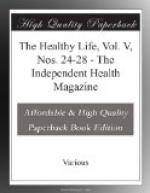May we ask the co-operation of all our readers during the holiday season in the following way. On holidays you are bound to meet fresh people, and make new acquaintances, and even friends. We suggest you purchase a few extra copies of THE HEALTHY LIFE_ before you start and hand them on to any likely to be interested. People tell us the magazine is its own recommendation. This does not mean that you need not add your own. The circulation grows steadily, but it is far short of what it might easily be if every reader were to gain one fresh reader every month._—[EDS.]
MORE APPRECIATIONS.
I want to say how very interesting and helpful I find The Healthy Life, and it is always a pleasure to buy an extra copy to give to friends, for I always feel it will do them good to read it, and perhaps make regular subscribers of them.
H. BARTHOLOMEW, Knebworth.
THE
HEALTHY
LIFE
The Independent Health Magazine.
3 AMEN CORNER LONDON E.C.
VOL. V AUGUST No. 25. 1913
There will come a day when
physiologists, poets, and
philosophers will all speak the same language
and understand one
another.—CLAUDE BERNARD.
AN INDICATION.
The pursuit of health, considered from the negative
standpoint, is the
flight from pain.
And pain is the great mystery of life.
James Hinton, himself a well-known physician of his time, attempted to solve the mystery of pain by showing that it is the accompaniment of imperfection. That what is now experienced as pain might be exquisite pleasure given a higher stage of human development.
But this, after all, only shifts the mystery one step farther. Instead of the mystery of pain we have the mystery of imperfection. Yet to image perfection is always to image something incapable of growth or further development.
Take, for example, a perfect circle. So long as it remains unbroken, flawless, the line (or infinite number of lines) composing it cannot be continued or extended. But given a break in the line and it may be continued round and round, up and up (or down and down) into an infinitely ascending spiral. This possibility of extension depends on a break, on an imperfection.
It does not follow, of course, that every flaw in human nature is always the starting-point of new growth, every failure a stepping-stone to greater knowledge, but the possibility is there. It is for men to see that they do not neglect their opportunities.—[EDS.]
IMAGINATION IN PLAY.




